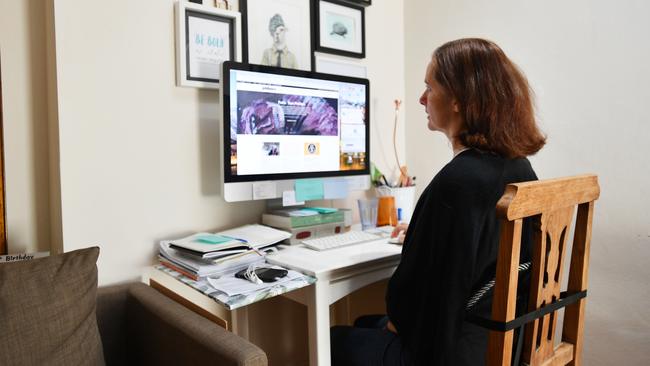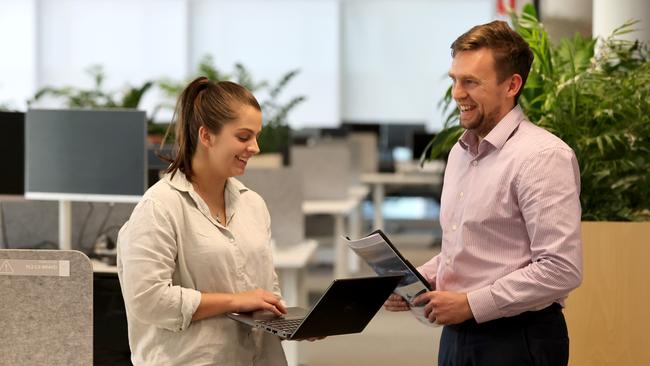Your Say SA: Survey reveals Fewer than one in five South Australians want to return to the office full time
Fewer than one in five South Australians are keen to return to the office full-time, the Sunday Mail’s annual Your Say SA survey has revealed.

SA News
Don't miss out on the headlines from SA News. Followed categories will be added to My News.
Employees are resisting a full-time return to offices despite easing of coronavirus restrictions, with an overwhelming proportion of Your Say survey respondents preferring to join the work-from-home revolution.
Only 18.4 per cent of South Australians said that, given the choice, they would prefer to work full-time from the office or workplace.
Another 40 per cent preferred a mix of home-based and office work, while 22 per cent said they preferred to work exclusively from home.
The overwhelming results indicate workers have embraced the increased flexibility of working from home, coupled with the time and cost-saving absence of daily commutes.
Premier Steven Marshall urged people who could return to CBD work to do so.
Of the online survey’s 1750 SA respondents, 19.7 per cent said their type of work could not be done from home.
Offices shut down as the first coronavirus wave swept across Australia in March last year, rapidly accelerating a work-from-home trend.
Workers embraced online meetings and collaboration, but CBD cafes and other businesses were devastated.
Since the end of formal lockdowns, continuing social distancing measures have required workers at many major businesses to adopt a mix of home and office work to comply with office capacity restrictions.
Latest Australian Bureau of Statistics figures showed jobs in the Adelaide City Council district had slumped by 6 per cent between the pandemic’s first wave and December 26.
In the same period, SA recorded a 2.5 per cent decrease in jobs, compared with a national decline of 3.6 per cent.
Mr Marshall said: “There’s absolutely no doubt the pandemic has disproportionably hit our CBD businesses, which makes it even more important for workplaces to entice workers back to work.”
“While the government understands flexible working arrangements are important for many South Australians, it’s vital as many people who can get back into work do just that,” Mr Marshall said.
He hoped the CBD would this year bounce back from a very difficult 2020 because of returning workers, comparatively light COVID-19 restrictions and the government’s travel voucher scheme.
Opposition Leader Peter Malinauskas said COVID had forced a rethink on the nature of work.
“While working from home has been great for some, it is not possible for everyone,” Mr Malinauskas said.
“Equally, we have seen the devastating impact COVID-19 has had on people in insecure work.
“Fewer people working in the CBD is having a negative impact on city businesses which rely on office workers.
“Now is the time for thoughtful policy that capitalises on SA’s strengths as a great place to work and live while also addressing SA having the highest underemployment rate in the nation.”
Public Service Association of SA general secretary Nev Kitchin said it was unclear how many staff were still working from home, but public servants had demonstrated they could be flexible, productive and responsive to the community’s needs during the pandemic.
Mr Kitchin said if a mixture of home and office work became the norm, careful consideration should be given to issues such as mental health, social isolation, WorkCover, IT support, tax deductions and home office costs.
“It’s important to recognise that the pandemic has changed the way we work and that, as a result, there may be ongoing changes to the way we work in the future,” Mr Kitchin said.
“The needs of the community, and the working conditions and wellbeing of the staff who deliver public services, must be central to any long-term operational changes in the public sector.
“Public sector workers contribute to a significant percentage of small-business trade, so we understand the importance tothose businesses, particularly during a devastating pandemic, of having those workers around to utilise their services.
“Our priority, however, is to ensure the safety of our members and the broader community.”
STOCK UP ON TRACKIES FOR THE NEW WORKING NORMAL

The experts agree – COVID has changed office life forever.
The “new normal” for white-collar workers going forward is likely to involve some time working from home after the pandemic proved that 40 or more hours a week in an office was not necessarily essential to getting the job done.
It is a philosophy reflected in the results of the Your Say SA survey, which showed that fewer than one in five of us – 18.4 per cent to be exact – were keen to return to the office full-time.
Thirty nine per cent of respondents would prefer a mix of home and office, 20 per cent would like to work exclusively from home and 22.4 per cent had jobs that could not be done from home.
For global defence giant BAE Systems, the coronavirus crisis was an opportunity to examine work practices.
BAE Systems Australia’s chief of future business Chris Keane said most of the company’s office workers went home when the pandemic hit, a situation that posed some unique challenges for an organisation that dealt with sensitive and sometimes secret information.
“We had to invest in new equipment and technology to make sure that we could get a vastly increased number of people online and working remotely,” Mr Keane said.
“And we had to take into consideration security, cyber threats and just making sure people stayed connected.”
Mr Keane said BAE Systems was growing rapidly in South Australia, with around 1000 new workers being brought on board last year and another 1000 set to join in 2021 to work on the Future Frigates program.
The expanding workforce, Mr Keane said, had made a CBD-based head office to complement its Edinburgh and Osborne sites more important than ever. The company’s finance, project management, communication and legal teams are currently settling into new digs on Flinders Street in the CBD.
“The operational sites are now at capacity because we’ve hired so many people,” Mr Keane said.
Obviously, war ships could not be built from home, but for those in BAE’s offices, Mr Keane said a “hybrid” approach was working well.
“People are spending some of their time in the office and some of their time at home, and have not only maintained productivity but, in many areas, increased it,” he said.
However, Mr Keane said that, despite rapid advancements in communication technology, there were still many benefits of physically working in the same space. “At the end of the day, you can’t beat face-to-face contact, and there are a lot of benefits from being in the office together that you perhaps don’t get from working remotely,” he said.
BAE Systems communication co-ordinator Isabel Gawel was happy to back in the office. “I can certainly see how working from home works better for some, but an office environment and being able to have face-to-face time with my colleagues really works for me,” she said.
BAE accountant Charles Woodham said he had enjoyed working from home, but that it was important to set some boundaries.
“You need to know when to turn off your computer as you can easily find yourself working later hours,” he said.
- Nathan Davies



